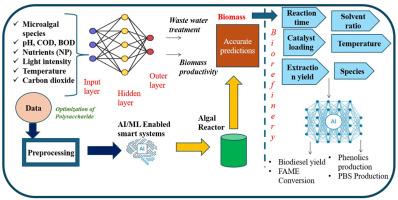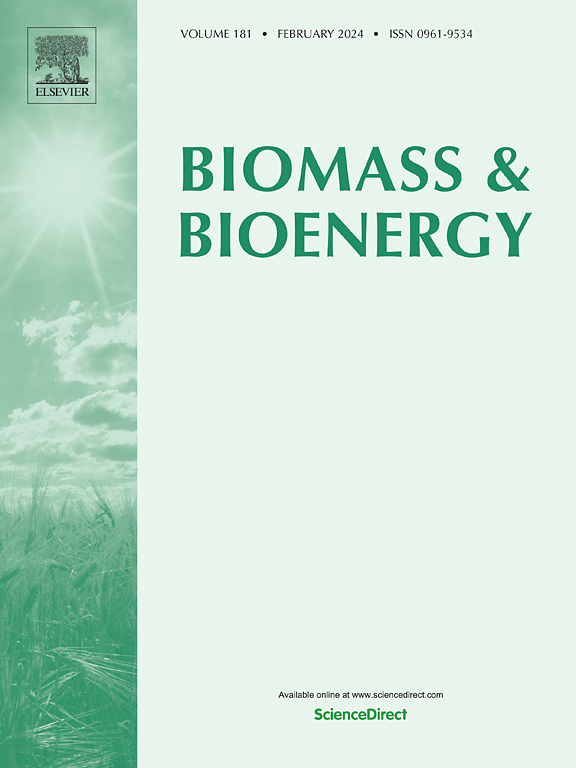通过藻类生物精炼推进生物燃料生产:优化多糖利用、人工智能驱动的创新和可持续性评估
IF 5.8
2区 生物学
Q1 AGRICULTURAL ENGINEERING
引用次数: 0
摘要
不断增长的全球能源需求和对化石燃料可持续替代品的需求加速了用于生物燃料生产的藻类生物精炼厂的发展。藻类多糖,如纤维素和半纤维素,由于其丰富的碳水化合物含量,提供了高潜力的原料。包括深共晶溶剂和物理化学技术在内的预处理方法的最新进展改进了酶水解,从而提高了转化率和发酵效率。这些改进大大提高了生物燃料产量,同时支持了环境的可持续性。人工智能(AI)和机器学习(ML)正在改变藻类生物过程优化。预测建模、人工神经网络和进化算法,如遗传算法、模糊逻辑和粒子群优化,有助于酶设计、发酵控制、成本降低和过程可扩展性。与此同时,技术经济和环境评估,特别是生命周期评估(LCA),对于评估资源效率、温室气体排放和长期可持续性至关重要。本综述重点介绍了多糖利用、人工智能驱动的创新和可持续性框架方面的进展,将藻类生物精炼厂定位为全球能源安全和向循环生物经济过渡的关键推动因素。本文章由计算机程序翻译,如有差异,请以英文原文为准。

Advancing biofuel production through algal biorefineries: Optimization of polysaccharide utilization, AI-driven innovations, and sustainability assessments
The growing global energy demand and the need for sustainable alternatives to fossil fuels have accelerated the development of algal biorefineries for biofuel production. Algal polysaccharides, such as cellulose and hemicellulose, offer high-potential feedstocks due to their rich carbohydrate content. Recent advances in pretreatment methods, including deep eutectic solvents and physicochemical techniques, have improved enzymatic hydrolysis, resulting in higher conversion rates and enhanced fermentation efficiency. These improvements have significantly increased biofuel yields while supporting environmental sustainability. Artificial intelligence (AI) and machine learning (ML) are transforming algal bioprocess optimization. Predictive modeling, artificial neural networks, and evolutionary algorithms such as genetic algorithms, fuzzy logic, and particle swarm optimization contribute to enzyme design, fermentation control, cost reduction, and process scalability. In parallel, technoeconomic and environmental assessments, particularly life cycle assessment (LCA), are vital for evaluating resource efficiency, greenhouse gas emissions, and long-term sustainability. This review highlights advancements in polysaccharide utilization, AI-driven innovations, and sustainability frameworks, positioning algal biorefineries as key enablers of global energy security and the transition to a circular bioeconomy.
求助全文
通过发布文献求助,成功后即可免费获取论文全文。
去求助
来源期刊

Biomass & Bioenergy
工程技术-能源与燃料
CiteScore
11.50
自引率
3.30%
发文量
258
审稿时长
60 days
期刊介绍:
Biomass & Bioenergy is an international journal publishing original research papers and short communications, review articles and case studies on biological resources, chemical and biological processes, and biomass products for new renewable sources of energy and materials.
The scope of the journal extends to the environmental, management and economic aspects of biomass and bioenergy.
Key areas covered by the journal:
• Biomass: sources, energy crop production processes, genetic improvements, composition. Please note that research on these biomass subjects must be linked directly to bioenergy generation.
• Biological Residues: residues/rests from agricultural production, forestry and plantations (palm, sugar etc), processing industries, and municipal sources (MSW). Papers on the use of biomass residues through innovative processes/technological novelty and/or consideration of feedstock/system sustainability (or unsustainability) are welcomed. However waste treatment processes and pollution control or mitigation which are only tangentially related to bioenergy are not in the scope of the journal, as they are more suited to publications in the environmental arena. Papers that describe conventional waste streams (ie well described in existing literature) that do not empirically address ''new'' added value from the process are not suitable for submission to the journal.
• Bioenergy Processes: fermentations, thermochemical conversions, liquid and gaseous fuels, and petrochemical substitutes
• Bioenergy Utilization: direct combustion, gasification, electricity production, chemical processes, and by-product remediation
• Biomass and the Environment: carbon cycle, the net energy efficiency of bioenergy systems, assessment of sustainability, and biodiversity issues.
 求助内容:
求助内容: 应助结果提醒方式:
应助结果提醒方式:


